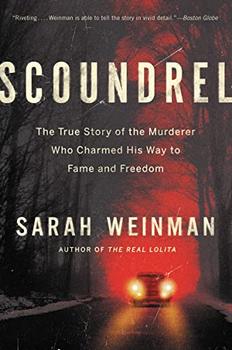Summary | Excerpt | Reviews | Beyond the Book | Readalikes | Genres & Themes | Author Bio

How a Convicted Murderer Persuaded the Women Who Loved Him, the Conservative Establishment, and the Courts to Set Him Free
by Sarah WeinmanIntroduction
EDGAR SMITH died on March 20, 2017, just over a month after his eighty-third birthday. He spent almost forty years in California's state penitentiary system, much of his last decade in health so poor that it was a surprise he survived so long. He was hard of hearing and barely able to walk more than a quarter mile, and even that short distance required a cane. A weak heart necessitating six bypass surgeries didn't kill him, either.
That Smith lived into his eighties is all the more remarkable because he was supposed to die nearly six decades earlier, executed by the state of New Jersey for the 1957 murder of fifteen-year-old Victoria Zielinski. At one time Smith was perhaps the most famous convict in America, counting William F. Buckley, Jr., founder of National Review and one of the key architects of the neoconservative movement, as his closest friend.
Scoundrel tells the true, almost too bizarre tale of a man saved from death row thanks to the years-long advocacy, through financial and creative means, of a most unlikely source. When police brutality and mass incarceration are perennially under a national microscope, when the lives of countless Black and Brown boys and men are permanently altered by the criminal justice system, the transformation of Edgar Smith into a national cause more than half a century ago raises uncomfortable questions about who merits such a spotlight and who does not. His story, and the involvement of the many people who helped fashion it, complicates the larger narrative of incarcerated people who proclaim their innocence and of prisoners—on death row and elsewhere—exonerated and freed thanks to newly discovered or long-suppressed evidence.
This book is, in effect, a story of a wrongful conviction in reverse.
As a result of Buckley's advocacy, Edgar Smith vaulted from prison to the country's highest intellectual echelons as a best-selling author, an expert on prison reform, and a minor celebrity—only to fall, spectacularly, to earth when his murderous impulses prevailed again. Though the relationship between Norman Mailer and the convict and author Jack Henry Abbott is well known, the comparable one between Buckley and Smith has received far less attention despite the resulting heinous fallout.
Buckley at first took up the Edgar Smith case out of righteous indignation on behalf of Smith, a man whom he believed to be wrongfully convicted and whose literary gifts, which transformed him from underachieving blue-collar worker to curious intellectual, made him worth saving. As Buckley came to regard Smith as a genuine friend, he also operated out of loyalty. As the lawyer and former National Review correspondent Donald G. M. Coxe told me, "We were taken in, I suspect, in part by our unwillingness to believe that anyone who loved NR could be a savage killer."
Even after it was clear that his faith in Edgar was severely misguided, Buckley concluded, "Edgar Smith has done enough damage in his lifetime without underwriting the doctrine that the verdict of a court is infallible." That unshakable belief exonerated a psychopath, elevating Smith to prominence and some power at the expense of the women he harmed, injured, and murdered. Buckley fell into the trap described in Fyodor Dostoevsky's Crime and Punishment: "An honest and sensitive man opens his heart, and the man of business listens and goes on eating—and then he eats you up."
* * *
IN MARCH 1957, Edgar Smith seemed like a typical young man living in New Jersey's Bergen County: married, the father of a newborn baby, a veteran of the marines, discharged because of partial deafness in his left ear, in between jobs. Victoria Zielinski, fifteen years old at the time, was murdered in the small town of Mahwah, her head bashed in by a baseball bat and a couple of large rocks. It didn't take long for authorities to find and arrest Smith: Zielinski's blood was on a pair of his pants and in the car he'd borrowed that day. He also admitted to the police that he had given her a ride, though he claimed that she was still alive when they had parted.
Excerpted from Scoundrel by Sarah Weinman. Copyright © 2022 by Sarah Weinman. Excerpted by permission of Ecco. All rights reserved. No part of this excerpt may be reproduced or reprinted without permission in writing from the publisher.
Flaming enthusiasm, backed up by horse sense and persistence, is the quality that most frequently makes for ...
Click Here to find out who said this, as well as discovering other famous literary quotes!
Your guide toexceptional books
BookBrowse seeks out and recommends the best in contemporary fiction and nonfiction—books that not only engage and entertain but also deepen our understanding of ourselves and the world around us.